|
|
|
Sort Order |
|
|
|
Items / Page
|
|
|
|
|
|
|
| Srl | Item |
| 1 |
ID:
068155
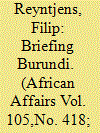

|
|
|
| 2 |
ID:
101913
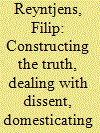

|
|
|
|
|
| Publication |
2011.
|
| Summary/Abstract |
Post-genocide Rwanda has become a 'donor darling', despite being a dictatorship with a dismal human rights record and a source of regional instability. In order to understand international tolerance, this article studies the regime's practices. It analyses the ways in which it dealt with external and internal critical voices, the instruments and strategies it devised to silence them, and its information management. It looks into the way the international community fell prey to the RPF's spin by allowing itself to be manipulated, focusing on Rwanda's decent technocratic governance while ignoring its deeply flawed political governance. This tolerance has allowed the development of a considerable degree of structural violence, thus exposing Rwanda to the risk of renewed violence.
|
|
|
|
|
|
|
|
|
|
|
|
|
|
|
|
| 3 |
ID:
157715
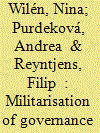

|
|
|
|
|
| Summary/Abstract |
In this article, we develop and expand the rebel-to-ruler literature to go beyond ‘rebel transformations’, in order to examine the transformation and militarisation of the entire post-genocide society in Rwanda. Through a historical and socio-political analysis of the military’s influence in post-genocide Rwanda, we argue that the adoption of military norms and ethos, drawn from an idealised and reconstructed pre-colonial history rather than simply an insurgent past, motivates the military’s centrality and penetration of all society’s sectors, economically, politically and socially, with the ultimate aim of retaining power in the hands of the rebels turned rulers. As such, the case demonstrates the need for an expansion of the rebel-to-ruler literature (1) beyond its concern with parties and regime type to a broader palette of governance effects and (2) beyond its singular focus on insurgent past and towards a longue-durée understanding of complementary causes
|
|
|
|
|
|
|
|
|
|
|
|
|
|
|
|
| 4 |
ID:
074914
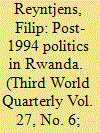

|
|
|
|
|
| Publication |
2006.
|
| Summary/Abstract |
When the Rwanda Patriotic Front (rpf) seized power in July 1994, winning the civil war and ending the genocide, this was seen by many as the succession of a bloody dictatorship by a decent government. Despite the early drift into authoritarianism, concentration of power and human rights abuse, Rwanda continued to be seen as a country in transition towards democracy. However, political transitions do not automatically lead from dictatorship to democracy, and Rwanda is but one of the illustrations of the weaknesses of the transition paradigm. Rather than liberation, inclusiveness and democracy, the rpf has brought oppression, exclusion and dictatorship. People's widespread and deep-rooted feelings of frustration, anger and despair are a fertile breeding ground for structural violence, and they are likely to again lead to acute violence.
|
|
|
|
|
|
|
|
|
|
|
|
|
|
|
|
| 5 |
ID:
172581
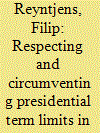

|
|
|
|
|
| Summary/Abstract |
This article offers a survey of political dynamics surrounding the issue of presidential term limits in a large sample of Sub-Saharan African countries over a long period of time. It examines empirically how political regimes have dealt with this issue by observing or circumventing limits, and it links these developments with the democratic quality in the countries at the time they occurred. Beyond legal texts, this study examines the empirical reality of term limits. It finds that effective term limits are less prevalent in practice than in constitutional texts. This is followed by an analysis of the incumbency bias, showing that incumbents who run often win at the election, but that transfers of power are more frequent in the absence of an incumbent. The article then considers the cost-benefit analyses leaders engage in when deciding to stay or to go, as well as the risks of overstaying. Domestic protest and international pressure generally have a limited impact on this choice. The article finally makes clear that political paths across Africa are very divergent, a feature also seen in the longevity of presidents.
|
|
|
|
|
|
|
|
|
|
|
|
|
|
|
|
| 6 |
ID:
051892
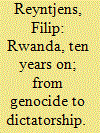

|
|
|
|
|
| Publication |
April 2004.
|
| Summary/Abstract |
Ten years after the 1994 genocide, Rwanda is experiencing not democracy and reconciliation but dictatorship and exclusion. Although the government led by the Rwanda Patriotic Front has achieved rapid institutional reconstruction and relatively good bureaucratic governance, it has also concentrated power and wealth in the hands of a very small minority, practised ethnic discrimination, eliminated every form of dissent, destroyed civil society, conducted a fundamentally flawed 'democratization' process, and massively violated human rights at home and abroad. The Rwandan army twice invaded neighbouring Zaire-Congo, where its initial security concerns gave way to a logic of plunder. It has caused protracted regional instability and derailed the transition process in the Democratic Republic of Congo. The Rwandan government has succeeded in avoiding condemnation by astutely exploiting the 'genocide credit' and by skilful information management. The international community has been complicit in the rebuilding of a dictatorship under the guise of democracy. It assumes a grave responsibility in allowing structural violence to develop once again, just as before 1994. In years to come, this may well lead to renewed acute violence.
|
|
|
|
|
|
|
|
|
|
|
|
|
|
|
|
|
|
|
|
|